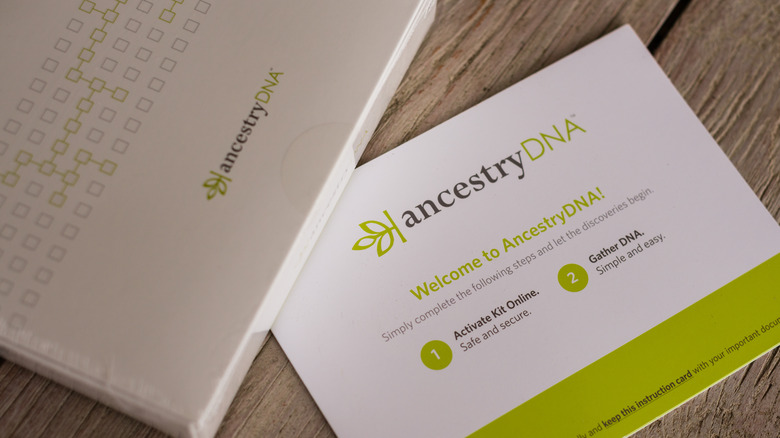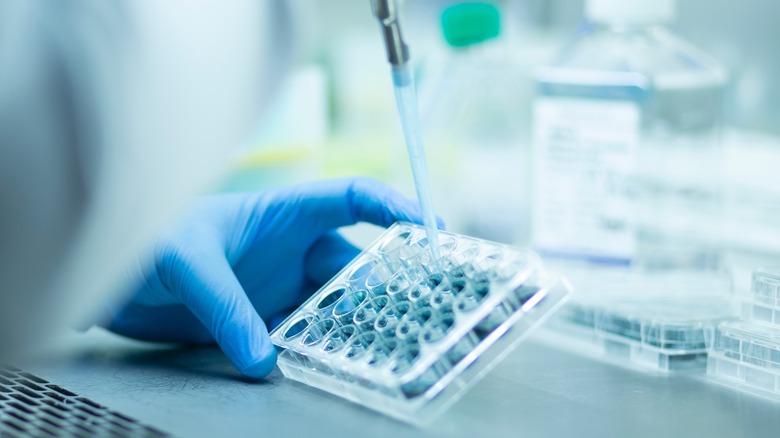Why The Police Method Used To Locate Bryan Christopher Kohberger Sparked Controversy
In November 2022, four University of Idaho students — Madison Mogen, Kaylee Goncalves, Ethan Chapin, and Xana Kernodle — were ruthlessly murdered at their off-campus home (via The New York Times). Less than two months later, ABC News writes that a suspect, 28-year-old Bryan Christopher Kohberger, was arrested in connection to the killings. The outlet notes that Kohberger was identified using DNA and a public genealogy database. An affidavit released in January provides more detail — a left-behind knife sheath at the crime scene had DNA on it that was later compared to trash recovered from his parents' home. It was determined that the DNA left on the knife sheath was likely from the son of the person who left DNA on the trash (via East Idaho News).
As the New York Post points out, this method is not new and has been used to solve decades-old cold cases. Notably, DNA from a genealogy database led the authorities to the Golden State Killer, Joseph James DeAngelo, in 2018.
In DeAngelo's case, The Pew Charitable Trusts writes that he was arrested after authorities uploaded DNA from a crime scene to a genealogy database called GEDmatch. The DNA was matched to DeAngelo's great-grandparents and subsequently traced back to him. According to a 2019 article from CNBC, over 26 million people have shared their DNA with a public genealogy database through an at-home DNA test such as 23andMe or Ancestry. The authorities, in turn, have been using this readily available data to solve crimes, sometimes without the knowledge of the individual who submitted the DNA or without even having someone submit their DNA (per the New York Post).
This is how police use DNA databases
The Pew Charitable Trusts explains that the police do not have unlimited access to genealogy databases; it depends on the company. For example, CNBC writes that Family Tree DNA provides the FBI access to their database. Investigators upload DNA from a crime scene and then use the matches they receive to compile a list of suspects. If users do not read the fine print, they might not be unaware that the authorities can use their DNA. With that said, some question if law enforcement should have access to these databases in the first place.
Moreover, the MIT Technology Review wonders if at-home DNA tests are more trouble than they are worth. As they put it (via CNBC), "But the consequences for privacy go well beyond that. As these databases grow, they have made it possible to trace the relationships between nearly all Americans, including those who never purchased a test." The New York Post reports that this was the case for Michael Usry. After using Ancestry's DNA database, police named him as a suspect in the 1996 murder of Angie Dodge.
Although Usry did not submit his DNA to the company, his father did. During the investigation, Usry says police kept him in the dark about what was happening. "I was like, 'Am I being accused of a crime? Do I need a lawyer?'" he told the New York Post. Usry was later cleared of any wrongdoing but was still shaken up by the situation. He told the outlet, "I know that my personal genetic information is still in the FBI criminal database." Usry added, "They're not going to just throw it away because of their mistake. But what are they doing with it?"
Experts believe that using DNA databases is for the greater good
A 2000 article titled "DNA Databases: When Fear Goes Too Far" from the American Criminal Law Review notes that DNA databases could ultimately wreak havoc between a government and its citizens due to privacy violations. Nevertheless, a 2019 study done by Pew Research Center found that 48% of Americans were okay with law enforcement using their DNA to solve crimes, and 18% were unsure. According to a 2019 article from NBC News, DNA databases led the authorities to solve 50 violent crimes across 29 states. When one company, GEDmatch, changed its privacy policy to prevent law enforcement from using its DNA databases, law enforcement and experts denounced this decision.
However, NBC News adds that GEDmatch users could choose to be a part of law enforcement searches as long as they opted in. Despite this, genealogy experts noted that this change in policy would make it harder to solve cold cases and other crimes. Genetic genealogist Colleen Fitzpatrick stated (via NBC News), "In the interest of public safety, don't you want to make it easy for people to be caught?" She added, "Police really want to do their job. They're not after you. They just want to make you safe."
According to The Pew Charitable Trusts, several states, including Utah, attempted to introduce bills to limit law enforcement's ability to use DNA databases. In 2022, Utah's bill failed to pass (per Forensic Magazine).


